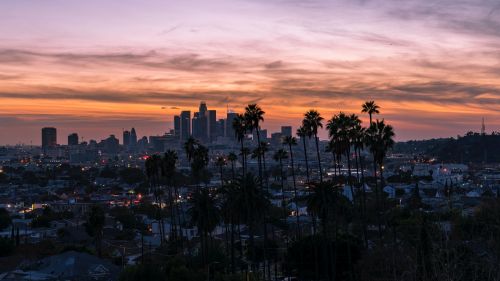Global Cities in 2020 – Ten Trends to Watch

With so much activity around cities in today's world, there is a lot to track. Here are ten trends in 2020 to watch where cities will be particularly influential on the global stage.
If the collective voice of cities has arrived and even matured on the global stage, it has done so as a result of a cocktail of political mobilization, policy exchange, and policy action. That cities can offer solutions to global challenges is, in other words, both a political argument and policy reality. This cocktail requires policy action in cities, as well as accountability and analytics around it. It requires global summits, long-familiar to diplomats and increasingly familiar to mayors, that allow for the building of relationships and institutions, the exchange of ideas, and the creation of a collective voice. And it requires the information sharing and mobilization with constituents.
With so much activity around cities today, it is a lot to track. Here are ten trends in 2020 I'll be watching where cities will be particularly influential on the global stage.
1. Punk and Policy!
Political mobilization can be fun, and it can be loud. Tune in on February 7 to the Clash for Climate on the Seattle radio station KEXP, or on the more than one hundred radio stations around the world broadcasting on International Clash Day content in collaboration with one of the world’s leading policy and climate action organizations, C40 Cities. Yes, there will be punk, but there will also be mayors, city officials, artists, and activists talking about what they are doing in cities around the world to address the climate emergency.
2. Diplomacy meets Culture
As Tom Stoppard reminded us even before Clash for Climate, geopolitics and rock n' roll have a little history. For World Urban Forum 10, the most traditional urban-focused diplomatic convening of the year, host Abu Dhabi has chosen culture as the thematic area of focus. Culture can mean rock n’ roll, of course, but in the UN-setting it can also be used as a counter, a defense of "tradition" against human rights or liberal values. The New Urban Agenda, now four years on, will be evaluated in this context, as will the important contributions cities are making to the Sustainable Development Goals.
3. Chicago on the Page
Late February will see the publication of former-mayor Rahm Emanuel's new book, The Nation City: Why Mayors are Now Running the World (Knopf). The paths to meeting the SDGs or the Paris Agreement for that matter, go through both city halls and national capitals. Even the most forward-leaning of city advocates recognize the need for national governments to provide access to finance and to implement policies to support local actions. While it still may be too early for historians to asses Emanuel’s run as mayor, few can rival his expertise in both city mechanics and politics and the national levers of power.
4. The Pritzker Forum Pivots
The 2020 Pritzker Forum on Global Cities, a partnership between the Chicago Council on Global Affairs and the Financial Times, will shift from previous years. Now in its sixth year, the Pritzker Forum will have a thematic focus for this year’s June convening: migration. The past two years have seen a significant build out in city-focused migration advocacy and policy exchange, including the advent of the Mayors Migration Council, and as organizations like the Open Society Foundations expand their city and migration work, the time for stock-taking is here.
5. Does the Electorate?
Migration is also likely to be paramount for the US presidential election. Thematic focuses of priority to urban residents, such as migration and climate change, promise to be front-and-center, as does rhetorical vilification of great US cities. And, of course, we will have an answer to the question of whether a mayor, whether from the East Coast or the Midwest, can become president.
6. LA in the Lead
One mayor who will not be in the race—this time around—is Mayor Eric Garcetti of Los Angeles, who opted out of a presidential run, and in October took over the chair of the C40 Cities Climate Leadership Group. Succeeding Mayor Anne Hidalgo of Paris, Garcetti is the first US mayor since Michael Bloomberg to hold the position. Los Angeles is already out front on cyber issues, migration, and city-to-state diplomacy, but the Green New Deal—in terms of definition, advocacy, and commitments will top the agenda.
7. A Museum Curates for City Action
In September, the United Nations will celebrate its 75th anniversary. The Museum for the United Nations: UN Live, currently under development in Copenhagen, will look as much to the future as to the past. Last year marked the museum's trial run with My Mark My City, which featured culture-focused events in more than twenty cities, stretching from Anchorage to Nairobi, to encourage SDG-related action. Working with young people, city leaders, and artists around the world, UN Live will roll out the second version of My Mark My City in 2020.
8. The Urban Wild Mobilizes
In October, national diplomats will gather in Kunming, Yunnan, China for the 15th meeting of the Conference of the Parties to the Convention on Biological Diversity. The Intergovernmental Panel on Climate Change’s 2018 special report on "Global Warming 1.5°C" presented a dire vision of the future of biodiversity. Even the slightest increase has huge implications. The number of insect species projected to lose their habitat, for example, is tripled at 2.0°C compared with 1.5°C. The number of plant species projected to lose their habitat is doubled. Ninety-nine percent of all corals would be lost at 2.0°C. Ecosystem loss has repercussions for global food security, forests, and water systems. Action around climate change and biodiversity is not limited to the parties, of course, and Mayor Valérie Plante of Montreal will be leading the organizational efforts as the city network ICLEI's Global Ambassador for Local Biodiversity.
9. Cities and the SDGs
2020 marks the 10-year mark to deliver on the 2030 Agenda for Sustainable Development. New York City is leading the charge of getting 100+ cities to sign the Voluntary Local Review Declaration "for local and regional governments worldwide to formally commit to reporting on the SDGs, using existing resources to ensure a low barrier to entry." Nations may not meet the goals, but cities are integrating the SDGs into their action plans and aligning their urban strategies against SDG guidelines and indicators. How many more cities will sign on to the VLR movement this year?
10. Geopolitics meets Urbanization
The exploration of ongoing urbanization in the context of the weakening of the liberal international order is the subject of the Great Powers and Urbanization Project (GPUP), with analysis being featured in the Diplomatic Courier. Questions addressed over the coming year will include the influence of Brussels on the continent’s cities, the differing national urban strategies of emerging regional Asian powers, and the urban strategies at the core of China’s Belt and Road Initiative. One platform the GPUP will be watching is the Urban 20, the G20's urban engagement group. Initially launched in Buenos Aires in 2018, Riyadh is taking the lead in attempting to integrate urban expertise and perspective into G20 proceedings.
More than two decades ago, Joe Strummer, the leadman for The Clash, declared: "The future is unwritten." By the looks of it, some of it, and a great deal of history, will be written in 2020.
